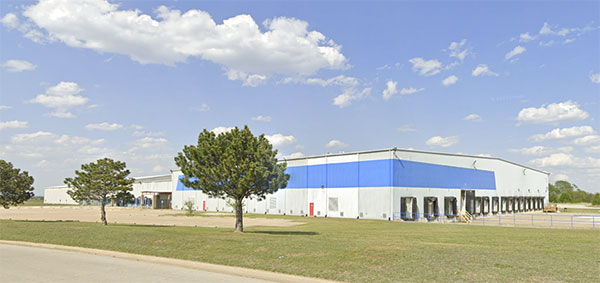Blue Whale Materials selects Bartlesville, Oklahoma for its first commercial-scale Li-Ion battery processing facility.
BARTLESVILLE, Okla. – Blue Whale Materials, a leader in sustainable li-ion battery recycling, proudly announces an inaugural li-ion battery processing facility in Bartlesville, Oklahoma. This strategic milestone underscores the company’s commitment to advance the domestic li-ion battery supply chain and create US sources of critical minerals for the green energy transition.
Blue Whale’s commercial facility will be situated within a 35-acre campus including 150,000 square feet of warehouse space at the Bartlesville Industrial Park and encompasses multiple lots designed to facilitate comprehensive battery processing, testing, dismantling, and storage. The project is expected to create over 90 new jobs in Bartlesville, contributing to local employment and economic prosperity.

“We are pleased to be able to contribute to the economic vitality of the region as we continue to reshape the battery industry,” stated Robert Kang, CEO and Co-Founder of Blue Whale Materials.
The strategic choice of Bartlesville was driven by various factors, including the state’s pro-business environment and commitment to clean energy, and the robust infrastructure present in the Bartlesville region. Blue Whale Materials’ decision reflects its eagerness to become part of Oklahoma’s thriving community and help contribute to the state’s sustainable growth.
Oklahoma Governor Kevin Stitt expressed his support for the decision: “I am thrilled to welcome Blue Whale Materials to Oklahoma, and I applaud their choice of Bartlesville for their innovative battery recycling facility. Blue Whale’s investment here aligns with our state’s “more of everything” approach to our nation’s energy needs. I met with their management team during the recruitment process and they believe Oklahoma is the best state to locate their company. We are ready to partner with them to provide the workforce and talent they need to thrive here.”
The facility will utilize Blue Whale Materials’ proprietary Blacksand™ technology that processes spent li- ion batteries and production scrap into a highly concentrated dry product containing cobalt, nickel and lithium as well as copper and aluminum products. Blue Whale Materials’ process removes organics and impurities, ensuring a high-purity material that simplifies downstream refining steps. Unlike traditional wet processes, which can complicate further refining, the dry Blacksand™ technology streamlines the recycling process and enhances the quality of the recovered materials.
For more information about Blue Whale Materials, please visit https://bluewhalematerials.com/.
About Blue Whale Materials: Blue Whale Materials is an innovative leader in sustainable battery recycling, dedicated to improving the li-ion battery value chain. With its proprietary technology, the company processes spent li-ion batteries to produce premium, high-concentrated Blacksand™ containing cobalt, nickel, and lithium. The company’s inaugural processing facility, located in Bartlesville, Oklahoma, is set to commence operations in late 2024. Blue Whale Materials also offers comprehensive end-of-life battery testing and grading services, through its BW Energy and Innovation battery testing and evaluation lab located in Greenfield, Indiana. For more information, please visit its website here.
About Ara Partners: Ara Partners is a private equity firm focused on industrial decarbonization investments. Ara Partners invests in the industrial and manufacturing, chemicals and materials, energy efficiency and green fuels, and food and agriculture sectors, seeking to create companies with significant decarbonization impact. It operates from offices in Houston, Boston and Dublin, Ireland. As of June 30, 2023, Ara Partners had approximately $4.4 billion of assets under management. For more information about Ara Partners, please visit www.arapartners.com.
Scott Ellyson, CEO of East West Manufacturing, brings decades of global manufacturing and supply chain leadership to the conversation. In this episode, he shares practical insights on scaling operations, navigating complexity, and building resilient manufacturing networks in an increasingly connected world.